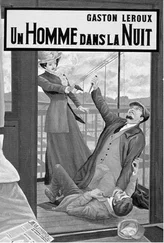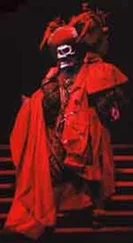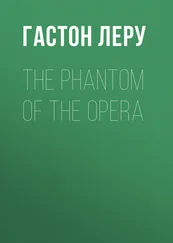Daaé revealed a new Margarita that night, a Margarita of a splendour, a radiance hitherto unsuspected. The whole house went mad, rising to its feet, shouting, cheering, clapping, while Christine sobbed and fainted in the arms of her fellow-singers and had to be carried to her dressing-room. A few subscribers, however, protested. Why had so great a treasure been kept from them all that time? Till then, Christine Daaé had played a good Siebel to Carlotta’s rather too splendidly material Margarita. And it had needed Carlotta’s incomprehensible and inexcusable absence from this gala night for the little Daaé, at a moment’s warning, to show all that she could do in a part of the program reserved for the Spanish diva! Well, what the subscribers wanted to know was, why had Debienne and Poligny applied to Daaé, when Carlotta was taken ill? Did they know of her hidden genius? And, if they knew of it, why had they kept it hidden? And why had she kept it hidden? Oddly enough, she was not known to have a professor of singing at that moment. She had often said she meant to practise alone for the future. The whole thing was a mystery.
The Comte de Chagny, standing up in his box, listened to all this frenzy and took part in it by loudly applauding. Philippe Georges Marie Comte de Chagny was just forty-one years of age. He was a great aristocrat and a good-looking man, above middle height and with attractive features, in spite of his hard forehead and his rather cold eyes. He was exquisitely polite to the women and a little haughty to the men, who did not always forgive him for his successes in society. He had an excellent heart and an irreproachable conscience. On the death of old Count Philibert, he became the head of one of the oldest and most distinguished families in France, whose arms dated back to the fourteenth century. The Chagnys owned a great deal of property; and, when the old count, who was a widower, died, it was no easy task for Philippe to accept the management of so large an estate. His two sisters and his brother, Raoul, would not hear of a division and waived their claim to their shares, leaving themselves entirely in Philippe’s hands, as though the right of primogeniture had never ceased to exist. When the two sisters married, on the same day, they received their portion from their brother, not as a thing rightfully belonging to them, but as a dowry for which they thanked him.
The Comtesse de Chagny, née de Moerogis de La Martyniere, had died in giving birth to Raoul, who was born twenty years after his elder brother. At the time of the old count’s death, Raoul was twelve years of age. Philippe busied himself actively with the youngster’s education. He was admirably assisted in this work first by his sisters and afterward by an old aunt, the widow of a naval officer, who lived at Brest and gave young Raoul a taste for the sea. The lad entered the Borda training-ship, finished his course with honours and quietly made his trip round the world. Thanks to powerful influence, he had just been appointed a member of the official expedition on board the Requin, which was to be sent to the Arctic Circle in search of the survivors of the D’Artoi’s expedition, of whom nothing had been heard for three years. Meanwhile, he was enjoying a long furlough which would not be over for six months; and already the dowagers of the Faubourg Saint-Germain were pitying the handsome and apparently delicate stripling for the hard work in store for him.
The shyness of the sailor-lad—I was almost saying his innocence—was remarkable. He seemed to have but just left the women’s apron-strings. As a matter of fact, petted as he was by his two sisters and his old aunt, he had retained from this purely feminine education manners that were almost candid and stamped with a charm that nothing had yet been able to sully. He was a little over twenty-one years of age and looked eighteen. He had a small, fair mustache, beautiful blue eyes and a complexion like a girl’s.
Philippe spoiled Raoul. To begin with, he was very proud of him and pleased to foresee a glorious career for his junior in the navy in which one of their ancestors, the famous Chagny de La Roche, had held the rank of admiral. He took advantage of the young man’s leave of absence to show him Paris, with all its luxurious and artistic delights. The count considered that, at Raoul’s age, it is not good to be too good. Philippe himself had a character that was very well-balanced in work and pleasure alike; his demeanour was always faultless; and he was incapable of setting his brother a bad example. He took him with him wherever he went. He even introduced him to the foyer of the ballet. I know that the count was said to be “on terms” with Sorelli. But it could hardly be reckoned as a crime for this nobleman, a bachelor, with plenty of leisure, especially since his sisters were settled, to come and spend an hour or two after dinner in the company of a dancer, who, though not so very, very witty, had the finest eyes that ever were seen! And besides, there are places where a true Parisian, when he has the rank of the Comte de Chagny, is bound to show himself; and at that time the foyer of the ballet at the Opera was one of those places.
Lastly, Philippe would perhaps not have taken his brother behind the scenes of the Opera if Raoul had not been the first to ask him, repeatedly renewing his request with a gentle obstinacy which the count remembered at a later date.
On that evening, Philippe, after applauding the Daaé, turned to Raoul and saw that he was quite pale.
“Don’t you see,” said Raoul, “that the woman’s fainting?”
“You look like fainting yourself,” said the count. “What’s the matter?”
But Raoul had recovered himself and was standing up.
“Let’s go and see,” he said, “she never sang like that before.”
The count gave his brother a curious smiling glance and seemed quite pleased. They were soon at the door leading from the house to the stage. Numbers of subscribers were slowly making their way through. Raoul tore his gloves without knowing what he was doing and Philippe had much too kind a heart to laugh at him for his impatience. But he now understood why Raoul was absent-minded when spoken to and why he always tried to turn every conversation to the subject of the Opera.
They reached the stage and pushed through the crowd of gentlemen, scene-shifters, supers and chorus-girls, Raoul leading the way, feeling that his heart no longer belonged to him, his face set with passion, while Count Philippe followed him with difficulty and continued to smile. At the back of the stage, Raoul had to stop before the inrush of the little troop of ballet-girls who blocked the passage which he was trying to enter. More than one chaffing phrase darted from little made-up lips, to which he did not reply; and at last he was able to pass, and dived into the semi-darkness of a corridor ringing with the name of “Daaé! Daaé!” The count was surprised to find that Raoul knew the way. He had never taken him to Christine’s himself and came to the conclusion that Raoul must have gone there alone while the count stayed talking in the foyer with Sorelli, who often asked him to wait until it was her time to “go on” and sometimes handed him the little gaiters in which she ran down from her dressing-room to preserve the spotlessness of her satin dancing-shoes and her flesh-colored tights. Sorelli had an excuse; she had lost her mother.
Postponing his usual visit to Sorelli for a few minutes, the count followed his brother down the passage that led to Daaé’s dressing-room and saw that it had never been so crammed as on that evening, when the whole house seemed excited by her success and also by her fainting fit. For the girl had not yet come to; and the doctor of the theatre had just arrived at the moment when Raoul entered at his heels. Christine, therefore, received the first aid of the one, while opening her eyes in the arms of the other. The count and many more remained crowding in the doorway. “Don’t you think, Doctor, that those gentlemen had better clear the room?” asked Raoul coolly. “There’s no breathing here.”
Читать дальше









